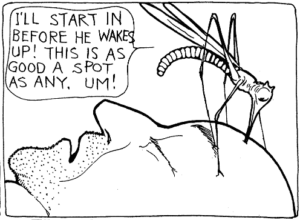By Debbie Burke
Like mosquitos in summer, scammers keep buzzing in with new tricks to suck the blood from writers. Here are three that recently hit my radar:
Scam #1 – We Pay You to Write!
A couple of months ago, several members of the Authors Guild received emails from individuals claiming to need articles or workbooks written for an upcoming seminar. The bait is a substantial fee and a promise of wider recognition through their organization. They may claim to have a disability, with the inference that if you write for them, you also enjoy the satisfaction of helping. Or…if you don’t write for their worthy cause, you should feel guilty. Con artists are masters at manipulation.
Here’s a sample invitation from “Paula Smith”:
Hello, My name is Paula, an academic consultant. I have a speech distorting condition called Apraxia. I got your contact details online and I need your service. Can you write an article on a specific topic for an upcoming workshop? The article is to be given as a handbook to the attendees of the workshop. I have a title for the article and have drafted an outline to guide you. Please get back to me for more information
(442) 278-5255
Paula
Fortunately, the author who received the solicitation investigated a little deeper and discovered “Paula’s” phone number had numerous complaints against it for fraud. A helpful resource to check out questionable phone numbers is callername.com.
More writers added their suspicions to the Authors Guild discussion group but weren’t sure how the scam worked.
Then AG member and travel writer Lan Sluder offered the following enlightening explanation:
|
Another AG poster who’s a member of the American Translators Association added that their members have also been targeted and shared the story of one victim. The scammer “overpaid” then asked the translator to wire money for the refund. Unfortunately, she did, shortly before the scam check bounced and she was out $2000.
Ouch!
Scam #2 – Fake Marketing Offers
These scammers keep reinventing themselves with different aliases and websites. Be wary of anyone who calls out of the blue or sends an email with wording similar to this:
Dear Author,
Our expert book scouts discovered your fabulous novel and we are excited to offer you an amazing opportunity. Because we believe so strongly in the bestseller potential of your book, we want to invest [fill in outrageous amount of money] in your marketing and publicity at absolutely no cost to you. We will reserve a place of honor for your book at the upcoming [fill in prestigious book fair or festival]. Your success will be our reward.
Sincerely,
A Company That Believes in Your Fantastic Talent (smirking)
After a few more flattering emails, they swoop in for the kill shot:
We reaffirm you do not have to pay one penny for our fabulous marketing package because our faith in you is so strong. To be fair, we know you’ll want to contribute your part by paying the bargain registration fee of only [fill in hundreds to thousands of dollars].
Here’s a post from YA author Khristina Chess who was contacted by Readers Magnet. Interestingly, they claim to be accredited by the Better Business Bureau as of 2019. However this BBB link shows multiple complaints against them.
 Here’s a list of companies that engage in practices that may technically be within the law but slide into slimy.
Here’s a list of companies that engage in practices that may technically be within the law but slide into slimy.
Before you engage any writing-related services, check them out on Writer Beware whose mission is: “Shining a bright light into the dark corners of the shadow-world of literary scams, schemes, and pitfalls.”
A big thank you to Writer Beware for watching out for writers!
Scam #3 – Impersonating Agents and Editors
Earlier this year, intrepid Victoria Strauss covered cases of scammers who assume the identity of legitimate agents or editors then contact unsuspecting authors. Of course, struggling writers are understandably thrilled to have a big-name agent contact them. Just be sure the person is who they claim to be. Here’s Victoria’s post.
On July 16, agent Victoria Marini @LitAgentMarini tweeted the following warning after learning someone had co-opted her name:
“It has come to my attention that someone is impersonating me online, likely in an attempt to scam writers. I am not associated with WritersDesk LLC, nor do I sell videos, materials, editorial work, or any other good or service. Many thanks to @victoriastrauss.”
Protect yourself from true crimes against writers. Always verify the source.
~~~
TKZers: Have you been solicited by questionable people or companies regarding your writing? Please share your experience and outcome.
~~~
Check out a devious scam with a unique twist in Debbie Burke’s thriller, Stalking Midas, available at this link.



Anything unsolicited that hits my inbox gets either junked or deleted. Period. End of story. The worst was the company (name long forgotten, but I think it had “publishing” or a variation in there) that got my phone number and wanted me to republish one of my books with them, the book obviously selected at random. I asked why they’d picked book 3 in a series. Canned, scripted responses. At least you can have a little fun when they’re talking live. Time spent with me is time they can’t spend scamming someone else.
Writers are prime victims for scammers because artistic endeavors are all about emotions, hopes, and dreams. We WANT to get offers and get noticed, so we do half the scammers job by fooling ourselves into thinking something shady is real.
Frankly, in this age of indie publishing, there are a lot of people looking to take advantage of writers, and it’s not always by per se scams. There are plenty of legitimate, yet low quality, offerings that are about as valuable as a scam–tons of inexperienced “editors,” cover “designers,” and “marketing reps” who have zero value.
Philip, you are absolutely right about emotions, hopes, and dreams. After many rejections, some writers are so thrilled by someone’s apparent appreciation of their hard work that they don’t recognize warning signs.
Low-value providers are another problem. I sometimes wonder if the cottage industries that have sprung up around indie publishing make more money than the authors ever do.
It’s like the saying goes, the people who made the most money during the Gold Rush were the ones selling pick axes.
“Time spent with me is time they can’t spend scamming someone else.”
Thanks, Terry, for tying them up so they don’t call me!
You and I have been around long enough to recognize the signs but I’m surprised at how many seasoned professional authors still get caught in scams.
Plus the scams keep evolving to better hide their true intent. A new one that just hit Authors Guild members is website ransom demands. An email arrives that includes “authors guild” in the sender’s address, making it appear legit. It claims the recipient has not paid fees and their website will be shut down in two days if they don’t bring their account current. Included in the message are links to supposedly secure payment sites. Fortunately, the Authors Guild immediately notified members that the message did NOT come from AG and they would never make such demands.
Sneakier and sneakier.
Ugh, an aspiring author just told me about New Degree Press. They’re a new kind of scam I hadn’t heard of of. What they do is pretend to be a crowdfunding service. You sign up and promise to crowdfund 5k, 9k, etc. Then you spam your friends and family and try to raise money. But here’s the kicker: none of that money goes to you. It goes to “buy cover art” and “format the ebook and paperback”. Some of it goes to “marketing” (whatever that is). You don’t get paid until your book is on sale. And they’ve already cannibalized your early sales to friends and family with this fake crowdfunding thing. I hope Writers Beware knows about this kind of scam, because it was a new one to me.
Kessie, thanks for the alert on New Degree. I hadn’t heard of that one. Sounds like a variation on multi-level marketing pyramid schemes where the author’s friends and relatives get roped in. Sad and sickening.
One of the biggest scams that I get hit with are book reviewers who claim to have stumbled across one of my books and “absolutely loved the sample.” But they want me to pay them to read/review. DELETE
Writer Beware are rockstars!
Oh yeah, Sue, I get those, too. Flattery evidently works well enough that they keep doing it.
Writer Beware is the best. They’ve saved several writer friends who almost fell for scammers’ sweet talk.
Thanks for this post, Debbie. I got that email from “Paula Smith” too, and wondered what the play was. Now it makes disgusting sense.
I’ll add a warning: scammers also target *freelance editors* with the overpayment scam. Be careful out there!
Meg, I too wondered how the scam worked and appreciated Lan’s explanation. So devious.
Thanks for the warning for freelance editors. We’re all at risk and have to watch out for each other.
Thank you for writing about this, Debbie. From the moment I published my first novel back in January 2017, emails began showing up in my author inbox offering “promotional” blogging tours, twitter campaigns, etc. Your scam #2. All from services I’ve never heard of, which is another red flag. It would be easy for a new writer to fall afoul of them.
I can spot #2 scams a mile away–for one thing, there’s nothing specific about the particular novel of mine they want to “promote” in their email, other than the title. The rest is obviously boilerplate copy. These marketing offers stick out like the proverbial sore thumb.
I keep in mind that for self-published authors today, there’s basically three legitimate marketing avenues–building your author newsletter (often using a “reader magnet”–a free story or novella), paying to have your book featured in a promotional newsletter like Book Book or Bargain Booksy (https://nicholaserik.com/promo-sites/ features a good listing of legit ones), and the “pay-per-click ads” on Amazon, Facebook and Book Bub (not to be confused with Book Bub featured deals).
Thanks again!
Ugh–that should have read “a promotional newsletter like Book Bub or Bargain Booksy. “Book Book” sounds like one of those scam marketing services 🙂
Dale, doesn’t that deluge of emails make you feel popular?
Interesting that one of the questionable marketing outfits adopted the name “Readers magnet”.
Shortly after my first mystery novel was published last August, I received five or six emails from different people/services who wanted to market my book. They might have been from the same person with different contact info listed. Like Dale’s experience, wording was boilerplate and none listed the title of my book.
First of all, TL, congratulations on your publication!
The same outfit often uses different names but it’s the same old song.
More Scams:
I maintain Elaine Viet’s website. I hope you like it. If you have a web site you buy your web address (domain name) from a service provider. Depending on the host, it is included. LOOK AT ANY EMAIL ABOUT YOUR DOMAIN. Most domain names are about $15-20 a year and are paid to the web host. There are numerous people who say your domain is going to expire and want $200-500 to take care of that for you.
On any email that is even remotely suspicious, hover over the senders name. Depending on how you read your email it will be easy or a little less so to read the email address really being used. It is quite easy to have an email show Google Support but be coming from ed9123283s@123.ru. The .ru part means registered in Russia.
Alan, thanks for contributing the great tip about hovering over the sender’s name.
The solicitations seem to run in spurts from different countries. Lately, most of my spam comes from Panama.
You can always google country code and then the dot two letter code. Last week one of my servers was attacked from Lichtenstein.
The Indonesia, Russian, Chinese, and Hong Kong hackers are a constant pain in my *bleep*. Thankful for Wordfence Security. Not only did they regain access to my site when a hacker from China took control one horrifying day, they keep my site safe from daily attacks. I swear it’s worse during the pandemic, like these hackers have WAY too much free time now. *sigh*
I have one question: Are you really Debbie Burke? Giggles galore
Good post, Debbie, and thank you for the links. A couple are now bookmarked for future use.
I know I’ve gotten emails from sketchy companies and reps. Just can’t remember any names.
Unless I’ve signed up for emails from said companies, I delete them immediately. It’s hard for me to believe that any reputable entity would solicit from a no-name, 3-books-under-her-belt author such as myself.
Sure, I’d like to be sought-after, but I’m not hungry enough to fall for scams…yet. The day’s still young. 🙂
No, Deb, this is Debbie’s evil twin. [Evil laugh]
Scammers are like robo calls. They don’t target anyone in particular. They just hope to snag anyone who answers.
“Your romance has been nominated for the Pulitizer Prize! Send lots of money to Nigeria to process your application!” It gave me a good laugh and a blog topic.
“Writer Beware” is an awesome resource. Be sure to join their email warning list.
Also, Business Musings ((Kristine Kathryn Rusch’s writing business blog) https://kriswrites.com/category/business-musings/ This is about contract law and the dirty dealings from traditional publishers who make most scammers jealous by their sheer evil audacity. Other topics are covered.
Marilynn, let us know when your Pulitzer is delivered. We’ll celebrate with champagne.
Thanks for mentioning Kris’s helpful site.
It’s been 12 years. Mail must be really slow from Nigeria!
Hahahaha!
Vanity presses are advertising on TV and radio now…which means they are raking in the dough. What really chaps my hide is when they say, “And we’ll make your book available to all the major bookstores!” Right. “Available.” And how many bookstores will jump at the chance to order a first novel from a writer no one’s heard of?
But MY novel is different! That’s the problem. Writers full of holes and dreams are preyed upon.
Sorry to hear they are still going strong. Ten years or so ago a writer came into my library branch and asked me why the library didn’t have the two novels she’d published. A quick internet search revealed it was a notorious vanity press that did a lot of business from printing books by aspiring sci-fi and fantasy authors and claiming it was publication.
Sad to see that recent resurgence of vanity presses, Jim. The pandemic has many people out of work and staying home who think, “Hey, I’ll write that book I always wanted to write.” Those inexperienced folks are ideal targets for such opportunists. Unfortunately, they are also ones who can least afford to be soaked.
I may well break the heart of legitimate marketing folks and those whose agenda and methods are entirely honest and honorable, or who have paid many, many box tops for the list they found my name on:
I do NOT respond to e-mail offers. Purely. Simply.
I do buy the books of many–as I can afford them–of the authors who mention them here on The Kill Zone.
We at TKZ appreciate your loyalty and support, Jim!
Scammers’ emails can be entertaining. I especially like the ones that have serious grammatical errors while promising great publishing success!
I got an interesting one the other day that wasn’t related to publishing. It was a typical phishing email that said someone had used my Amazon id and wanted me to log in at the link on the email. The funny part was the line at the bottom: “All rights reversed.”
“All rights reversed”. Spell check didn’t catch that, did it? Thanks for a good laugh, Kay.
As you say, poor language skills are one big tip-off. This one landed in my mailbox this morning. Since s/he is a translator, it wasn’t nearly as awful as some are.
“I am working in Chinese and English.
I have 5 years of experience in translation, I also translated books before. If you are looking for a Chinese translator, tell me.
My rate is around
Language pair
Rate of translate
Simplified Chinese into English
0.04 USD per word
Please note that I can translate a text of any length. Feel free to ask if you have any questions.
I also have a big team to translate other languages. Our team is specialized in book translation.
Rates/Salary will be discussed after the description of your project/needs.”
Debbie, I had a story optioned a few years ago and ever since then I get emails from organizations 1) wanting me to submit a screenplay for a contest and 2) offering me 20% off of the submission fee if I apply for the privilege of submitting within five days. As my Italian grandmother used to say, “Ba Fungu”!
Joe, your wise granny taught you well.
Heck, b/c you’re such a good friend, I’ll give you 50% off the submission fee if you send me bitcoins by midnight.
“Hi. I’m from the government and I’m here to help you.” That’s a message to ignore.
Garry, are you saying Canadians don’t think their government is perfect either? I’m shocked.